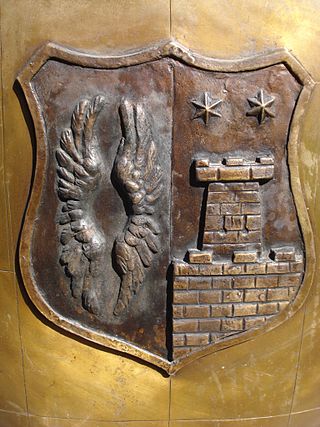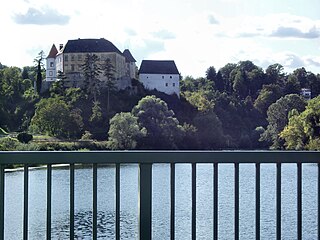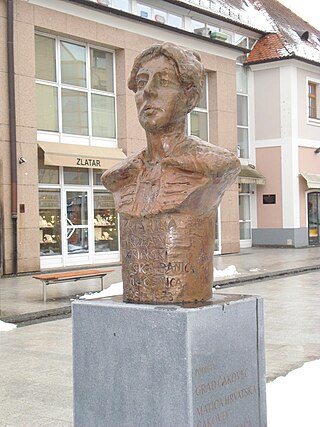
The House of Frankopan, was a Croatian noble family, whose members were among the great landowner magnates and high officers of the Kingdom of Croatia in union with Hungary.

The House of Zrinski or Zrínyi was a Croatian-Hungarian noble family, a cadet branch of the Croatian noble tribe of Šubić, influential during the period in history marked by the Ottoman wars in Europe in the Kingdom of Croatia's union with the Kingdom of Hungary and in the later Kingdom of Croatia as a part of the Habsburg monarchy. Notable members of this family were Bans of Croatia, considered national heroes in both Croatia and Hungary, and were particularly celebrated during the period of Romanticism, a movement which was called Zrinijada in Croatia.

Petar IV Zrinski was Ban of Croatia (Viceroy) from 1665 to 1670, general and a writer. A member of the Zrinski noble family, he was noted for his role in the attempted Croatian-Hungarian Magnate conspiracy to overthrow the Habsburgs, which ultimately led to his execution for high treason.

The Crnković family are a Croatian noble family with its roots in the district of Gorski kotar.

Eugen Kumičić was a prominent Croatian writer and politician. Kumičić was one of the most prolific Croatian novelists of the realism era and a pioneer of naturalism in Croatian literature.

Fran Krsto Frankopan was a Croatian baroque poet, nobleman and politician. He is remembered primarily for his involvement in the failed Zrinski-Frankopan conspiracy. He was a Croatian marquess, a member of the Frankopan noble family and its last male descendant.

Trsat is part of the city of Rijeka, Croatia, with a historic castle or fortress in a strategic location and several historic churches, in one of which the Croatian noble Prince Vuk Krsto Frankopan is buried. Trsat is a steep hill, 138 m high, rising over the gorge of the Rječina river, about a kilometre away from the sea; strategically significant from the earliest times right up to the 17th century, it is today a major Christian pilgrimage centre and home to a statue of Pope John Paul II who came to Trsat as a Pilgrim in 2003. Today, the University of Rijeka's newly constructed campus lies in the western part of Trsat.

The system of honours of the Republic of Croatia was established after the independence of Croatia in 1991. There are nineteen main decorations conferred since 2019, in addition to several other medals and awards.

Ozalj is a town in central Croatia, located north of Karlovac and southwest of Jastrebarsko, on the Kupa River. It is close to Žumberak in the north and the border with Slovenia in the northwest, with Metlika being the closest Slovenian town.

The Magnate conspiracy, also known as the Zrinski-Frankopan Conspiracy in Croatia, and Wesselényi conspiracy in Hungary, was a 17th-century attempt to throw off Habsburg and other foreign influences over Hungary and Croatia. The attempted coup was caused by the unpopular Peace of Vasvár, struck in 1664 between Holy Roman Emperor Leopold I and the Ottoman Empire. The poorly organized attempt at revolt gave the Habsburgs reason to clamp down on their opponents. It was named after Hungarian Count Ferenc Wesselényi, and by Croatian counts, brothers Nikola Zrinski and Petar Zrinski and Petar's brother-in-law Fran Krsto Frankopan.

Countess Ana Katarina Zrinska was a Croatian noblewoman and poet, born into the House of Frankopan, Croatian noble family. She married Count Petar Zrinski of the House of Zrinski in 1641 and later became known as Katarina Zrinska. She is remembered in Croatia as a patron of the arts, a writer and patriot. She died in obscurity in a monastery in Graz following the downfall of the Zrinski-Frankopan conspiracy in 1671 and the execution of both her husband Petar Zrinski and her brother Fran Krsto Frankopan. Her most notable literary work is Putni tovaruš, written 1660 at her estates in Ozalj.

The Society of Brethren of the Croatian Dragon is a Croatian historical and cultural society founded on November 16th, 1905.
Events from the year 1919 in Croatia.

Nikola Šubić Zrinski Square is a square and park in Donji Grad, the central part of Zagreb, the capital of Croatia. It is located near the central Ban Jelačić Square, halfway towards the Main Railway Station. It is a part of the Green horseshoe or Lenuci's horseshoe, which consists of seven squares in Donji grad. It is spread over an area of 12,540 square meters (135,000 sq ft).

Countess Ilona Zrínyi was a noblewoman and heroine. She was one of the last surviving members of the Croatian-Hungarian Zrinski/Zrínyi noble family. She was the daughter of Petar Zrinski, Ban (viceroy) of Croatia, the niece of both Miklós Zrínyi and Fran Krsto Frankopan and the wife of Francis Rákóczi I and Imre Thököly, as well as the mother of Francis Rákóczi II. She is remembered in history for her Defense of Palanok Castle against the Imperial army in 1685-1688, an act for which she was regarded a heroine in Hungary.

Josip Jović was a Croatian policeman who was killed during the Plitvice Lakes incident. He is widely considered the first Croatian fatality of the Croatian War of Independence.
Andrija Andabak was a Croatian soldier who distinguished himself in the Croatian War of Independence.
Thomas Crowley was an Irishman who fought in the Croatian War of Independence.

Zvečaj is a medieval ruined castle located on the left bank of the Mrežnica river in modern Karlovac county, Croatia. Around it formed an eponymous village, today separated into upper and lower. It has a rectangular floorplan, with a central tower. It survived in good condition much longer than most castles in the region.

Franz III. Nádasdy was a chief judge and general in Hungary. He was one of the leaders of the Magnate conspiracy against Holy Roman Emperor Leopold I. After the conspiracy was revealed, he and two other leaders were all executed.


















